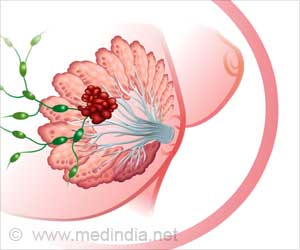Breast cancer in young women can have good outcomes if guideline-recommended treatments are administered, which can significantly increase survival and reduce the chances of recurrence.
- Young breast cancer patients can possibly have good outcomes
- This requires following guideline-recommended therapies
- Strict adherence to advised therapies can significantly increase survival and reduce the risk of recurrence
The study findings are being presented at the European Society for Medical Oncology (ESMO) Breast Cancer Congress 2019 in Berlin, Germany.
In this regard, ESMO Spokesman Dr. Matteo Lambertini, MD, PhD, from IRCCS Policlinico San Martino Hospital, University of Genoa, Italy, said: “Women under 40 years of age tend to be diagnosed with more aggressive breast cancer types - for example their tumors are more likely to be triple negative and HER2 positive. Despite this, survival and local recurrence rates are similar to those of the general population of breast cancer patients provided they receive appropriate treatment.”
Read More..
Study 1: Breast Cancer in Young Women - A Multi-Center 10-Year Experience
Study AimsCharacterization of a cohort of young women with breast cancer with reference to incidence, biology, tumor stage, treatment, and survival.
Study Methods
- This was a retrospective, multi-center study, conducted between 2008-2017
- All breast cancer patients were below 35 years of age
- The study included 207 patients from 5 centers
- 35 patients were excluded from the study due to the following reasons:
- 27 due to lack of data
- 1 due to two different synchronous tumors
- 7 due to ductal in situ carcinoma
- Data were analyzed using the Statistical Package for the Social Sciences (SPSS, IBM, USA)
- The median age of the patients was 31 years
- The most common (91%) histological subtype was ductal invasive carcinoma
- The tumors were categorized into the following subtypes:
- 4 percent: Luminal A
- 20 percent: Luminal B HER2 positive
- 47 percent: Luminal B HER2 negative
- 8 percent: HER2 positive
- 21 percent: Triple negative
- 48 percent of patients were diagnosed with early stage breast cancer
- 45 percent of patients had locally advanced breast cancer
- 6 percent of patients had de novo metastatic breast cancer
- 39 percent of patients underwent neoadjuvant chemotherapy (CT), of which 12 percent gave a complete response
- 83 percent of patients underwent adjuvant systemic therapy (CT or endocrine therapy)
- 18 percent exclusively underwent endocrine therapy
- The median follow-up time was 53.5 months
- 37 patients developed metastatic breast cancer
- The median survival time was 16.5 months for metastatic breast cancer
- 3 patients had a local recurrence with a median time of 27 months
- 85 percent of the patients were alive at the time of termination of the study
Study 2: Breast Cancer Early Recurrences in Young Women
Study AimsAnalysis of rates of recurrence of cancer in young breast cancer patients.
Study Methods
- This was a retrospective study conducted between 2010-2017
- Medical records of 381 women ≤ 50 years were analyzed
- The women were undergoing treatment for Stage I-III invasive breast cancer
- The following parameters were assessed:
- Demographics
- Tumor biology
- Type of surgery
- Neoadjuvant/adjuvant therapy
- Site/time of recurrence
- Survival
- Overall survival (OS) and disease-free survival (DFS) were calculated using Kaplan-Meier survival curves
- The median age of the patients was 45 years
- The median follow-up time was 45.6 months
- 22 patients (5.8%) were lost to follow-up
- 29 patients (7.6%) relapsed, among which 9 died
- 2 patients developed a second tumor in the contralateral breast
- The median interval to recurrence was 31 months
- The 3-year and 5-year risk for loco-regional recurrence was 4.7 percent and 9.5 percent respectively
- The 3-year and 5-year DFS was 94.3 percent and 91.2 percent respectively
- The 5-year OS was 93.3 percent
Conclusion
The findings of the two studies indicate that being diagnosed with breast cancer at a younger age does not necessarily mean lower survival or higher chances of recurrence. Importantly, proper guideline-recommended treatments should be administered to all breast cancer patients, irrespective of age, with due attention to possible side-effects of anticancer therapies, including infertility.References:
- Breast Cancer in Young Women: Good Outcomes with Advised Therapy - (https://www.esmo.org/Press-Office/Press-Releases/Breast-cancer-young-women-aggressiveness-recurrence-Cima-Eiriz)
- Ines F. Eiriz, Breast Cancer in Young Women - A Multi-Center 10-Year Experience, Annals of Oncology, Volume 30, 2019 Supplement 3.
- Simona Cima, Breast Cancer Early Recurrences in Young Women, Annals of Oncology, Volume 30, 2019 Supplement 3.
Source-Medindia
















